#and connected to HaShem
Explore tagged Tumblr posts
Text
Found a subreddit for “skeptical, atheist, agnostic and science-seeking” witchcraft - hell yeah.
This will fix me.
#we are going to engage in so much meaning making 😈#witchcraft was genuinely so helpful for me regardless of how ‘real’ it was#but then I converted and dropped all of it#because I wanted to be a good jew#but now I care less#hashem and I are good even if I’m not always feeling the community connections
8 notes
·
View notes
Text
Unity Inspires Projects - United Souls 54 - Going Forward with The Authentic Soul of End of Days Flow vs the Fake AI. The Treasure Chest & Inner Real Wisdom!
United Souls 54 – Section 2 by Eli Goldsmith – A Journey towards Real Unification Everyway Continued – Happy Healthy Summer 2025 5785 Blessings All – Let’s Share Unity Bookings & Inspired Projects are All Growing for Your Community’s Benefit… Please Connect to the Links Below and Let’s Book the Right Inspired Creatives for Your Events… Follow here…
#Aliya#Artist#Ashkelon#Bar Mitzvah#Beautiful#Black Family#Bless#Blessing#Chabad#Comedian#Connect#Devek#Emuna#Emunah#Faith#Family#Fear#Festival#Flying#Gal#Gaza#Gerim#Gratitude#Hamas#Happy#Hashem#Hip Hop#holyland#IDF#Inspires
2 notes
·
View notes
Text
The Book of Esther shows us a Jewish queen in exile, and the story resonates with the echoes of the priestess/goddess roles. In the ancient Persian religion, Spring was a time to draw lots to determine the king's new advisors. Ishtar (goddess of love and war), and Marduk (god of war and justice), would have been prominent characters in the new year ritual drama. The Book of Esther transforms the tradition into a saga of Jewish survival, appropriating the role of the preserver of life (Ishtar) for Esther and the position of the protector of the people (Marduk) for Mordechai. The Book of Esther allows Jews to be part of the larger culture's mythic tale of Spring and to remain true to their Jewish identity at the same time.
Esther's story is a twist on the descent of the goddess Ishtar into the underworld. In Babylonian myth, the goddess Ishtar strips herself of her clothing and royal garb to enter the underworld. Ishtar's sister, Ereshkigal queen of the underworld, afflicts Ishtar with disease and death. After the other gods plead with Ereshkigal to let Ishtar go, Ishtar's royal robes are returned to her.
Esther, a young Jewish girl, finds herself in a Persian harem. Esther must strip herself of her identity and pretend she is not a Jew, just as Ishtar must strip herself of goddesshood in the underworld. Later, under the influence of the evil vizier Haman, the king makes the decree that all Jews be assassinated. Esther's uncle Mordechai begs Esther to go to the king, even though it is forbidden, risking her life to save her people. Before doing so, Esther fasts for three days. Her three days of fasting may be an allegory for Ishtar's trials in the underworld.
On the third day, Esther garbed herself in royalty, and stood in the inner court of the king's palace, and the king sat on his royal throne in the palace opposite the doorway. When the king saw Esther standing in the courtyard, she found favor in his eyes, and the king extended to her the golden scepter in his hand, and Esther drew near and touched the scepter's head.
-Esther 5:1-2
One cannot miss the strong parallel between Esther's robing herself in royalty and Ishtar's queenly robing as she leaves the underworld. When Esther enters the king's throne room and touches the tip of his royal scepter, she is enacting the sacred marriage between Ishtar and the king. Although in a Jewish story this image is probably meant to be ironic, it can also be seen as Esther's acting as a priestess, channeling the power of the divine feminine in the human realm.
Pg 136-137, The Hebrew Priestess
#cipher talk#Kohenet Judaism#There isn't a good soundbyte quote but another interesting part of this Queen-Priestess section is the conceiving of it as a warrior#Position with people who have taken on this role standing guard at kohenet rituals#Also it compares Judith to Anat which is. Interesting! They do both indeed have a prominent characterization as mourners#Though I think the connection drawn between Anat's connection to Egyptian Jews and the Egyptian Jews that may have written Judith is#Anachronistic- if Judith is of Egyptian origin she's prob from the pens of Hellenized Jews#Not the Elephantine Jews of centuries earlier that saw Anat as Hashem's consort/maybe an emanation of Hashem#We have no known examples of Elephantine Jewish religious literature. Legal documents yes. That stuff? Nope
12 notes
·
View notes
Text
Here's how I see it- this arguing and fighting goes both way
We can go to hashem and say, you're wrong about this, what the fuck
And sometimes hashem says you're right and backs off. But sometimes he says no. You're the ones who are wrong. Sometimes, often, hashem argues back.
And emunah is knowing and accepting the fact that hashem is are father and our king. And while questioning and arguing is important and a part of us, when hashem says "you're the onces who need to rethink", we rethink.
It's a relationship. It goes both ways, and both sides need to work on it.

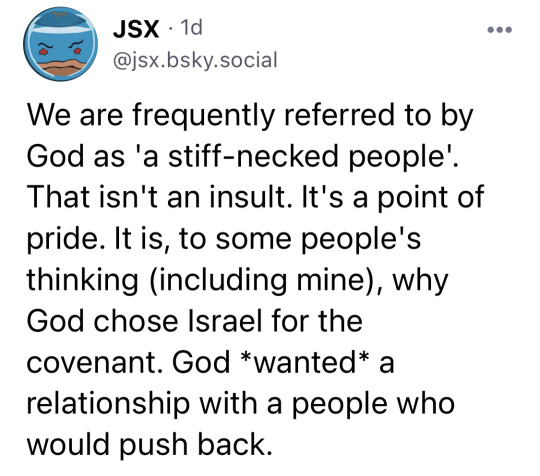
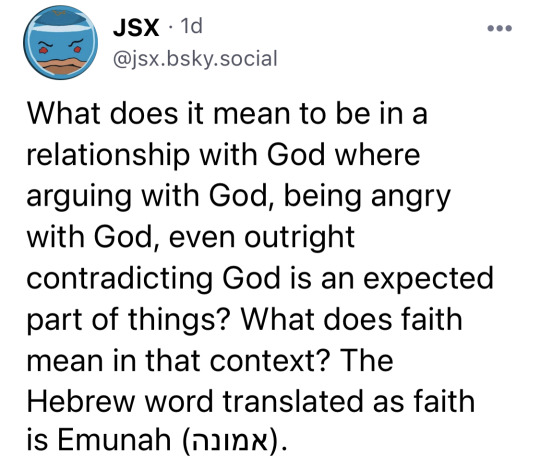
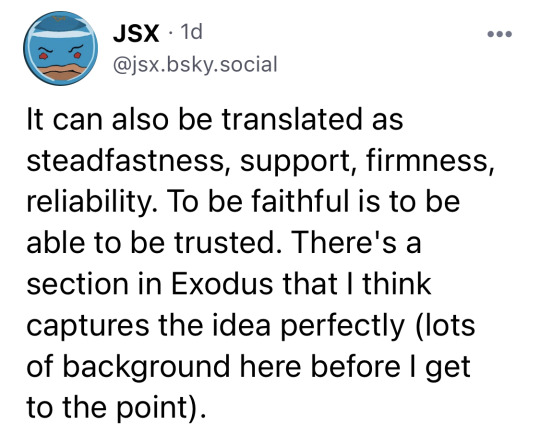
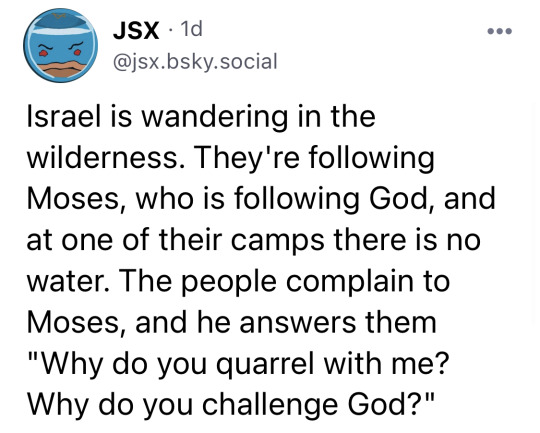
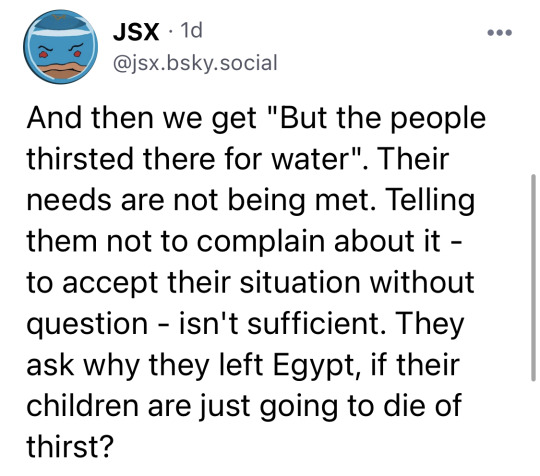
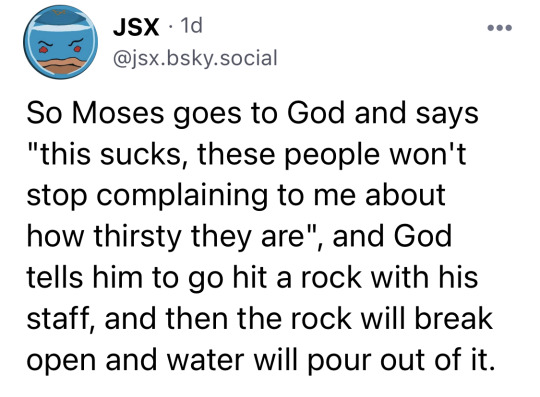
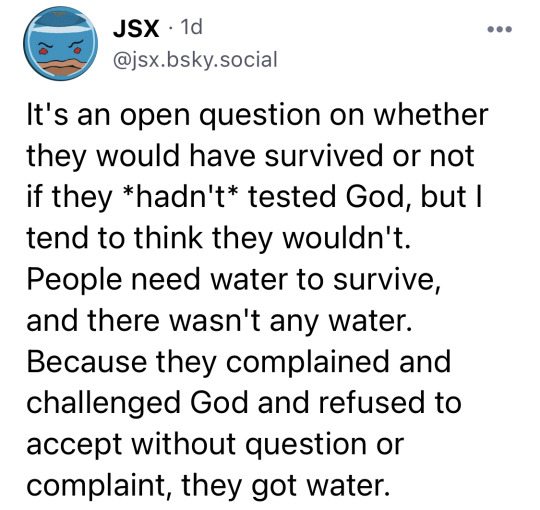
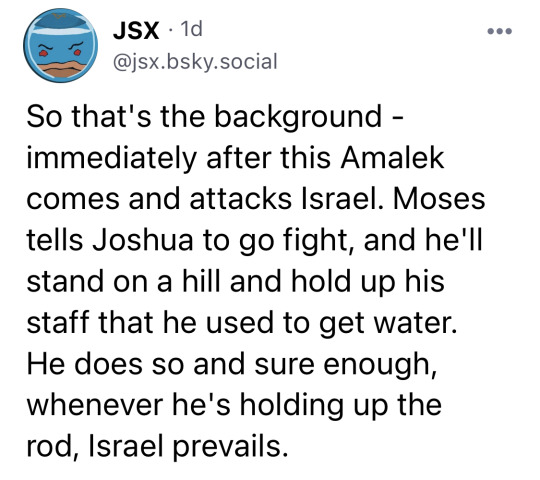
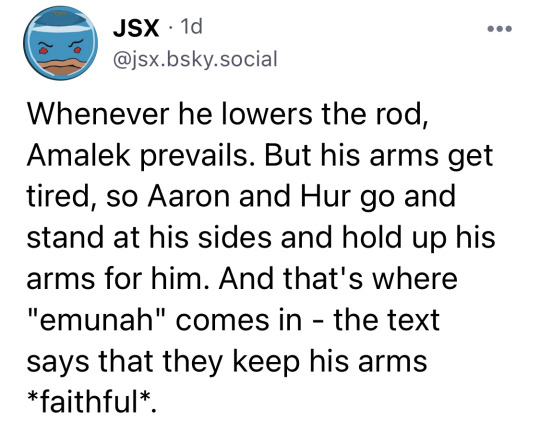
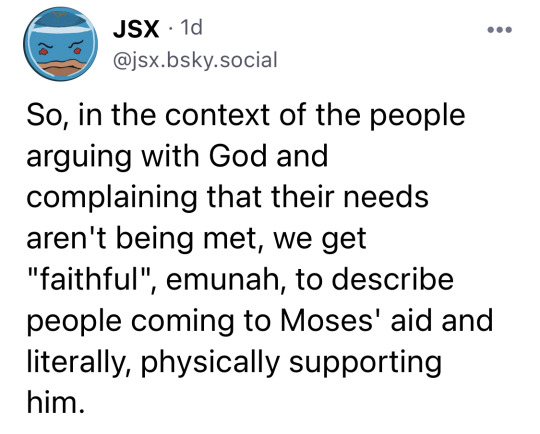
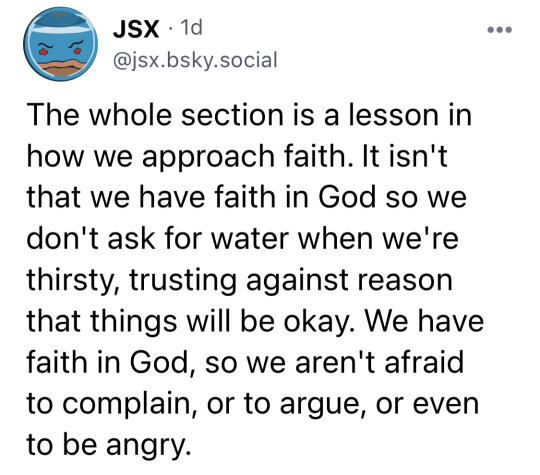
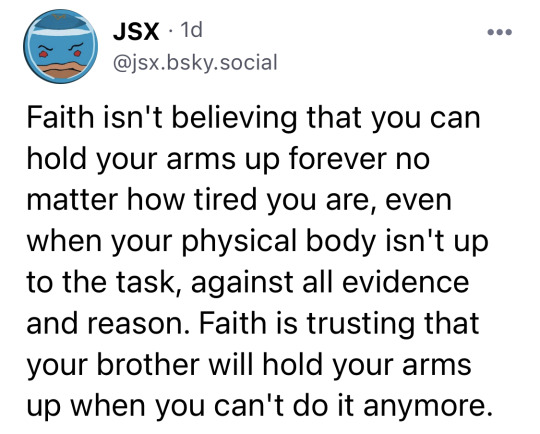
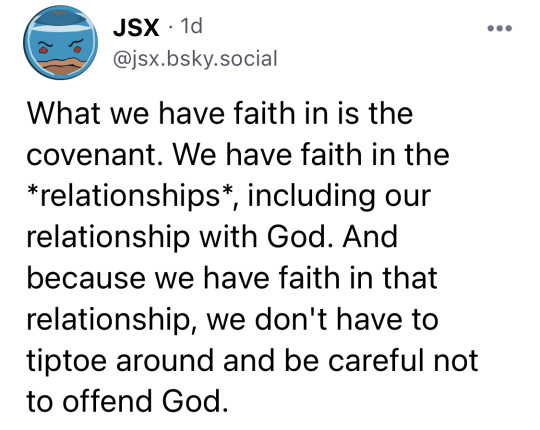
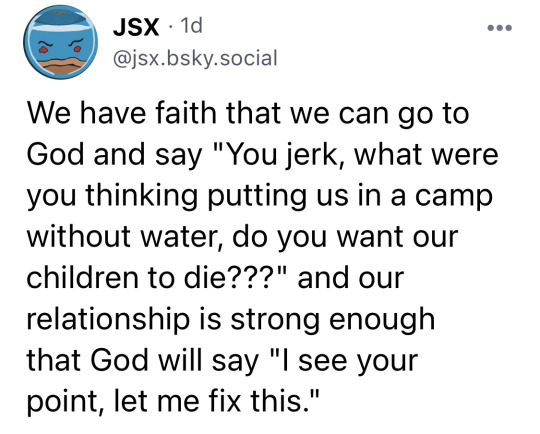
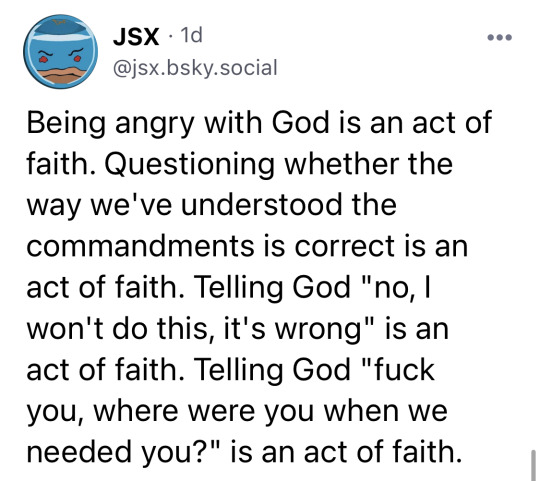
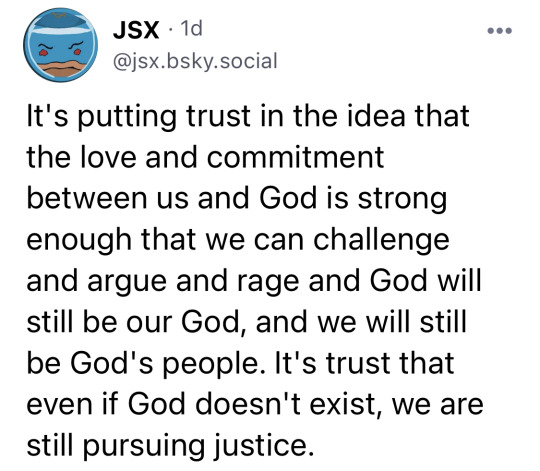
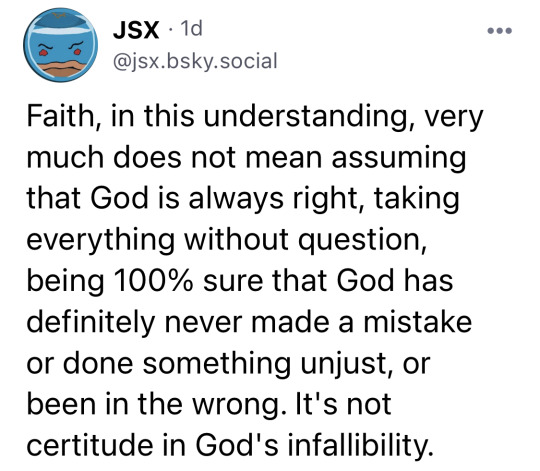
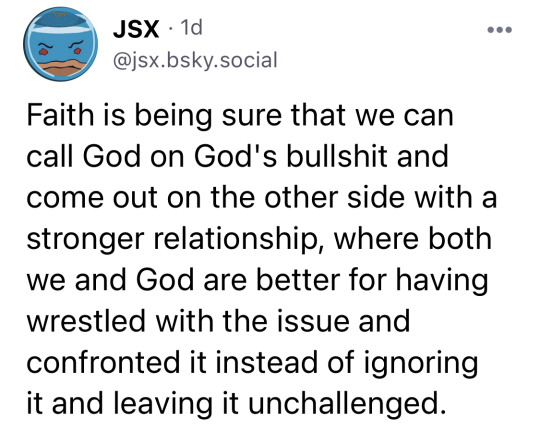
#i really think the reason our connection to hashem is constantly painted as husband and wife#is so we also have the part about having to WORK on it#it's not just a parent-child relationship that you are stuck with forever because this is the family you were born to#you also choose this#and you have to keep choosing#judaism
3K notes
·
View notes
Text
Oh, and so the Amsterdam Pogrom was a pre-planned, coordinated attack, organized by a fucking former UNRWA teacher who was connected to Hamas, and the Amsterdam Police were colluding with the terrorists to attack Jews, and it wasn't just a bunch of "football hooligans" like you fucking idiot antisemites have been gaslighting us about?
Yeah, we Jews knew all along, this had Hamas and the Islamic Republic of Iran's fingerprints all over it.
Baruch Hashem the terrorists were too fucking incompetent to take hostages, even though they tried, because that was the plan. Take hostages, and use their capture to torture the Israeli people.
336 notes
·
View notes
Text
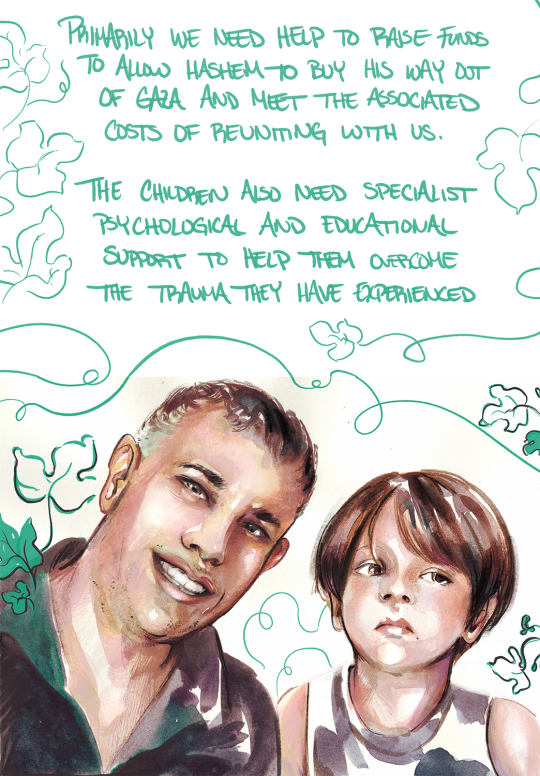
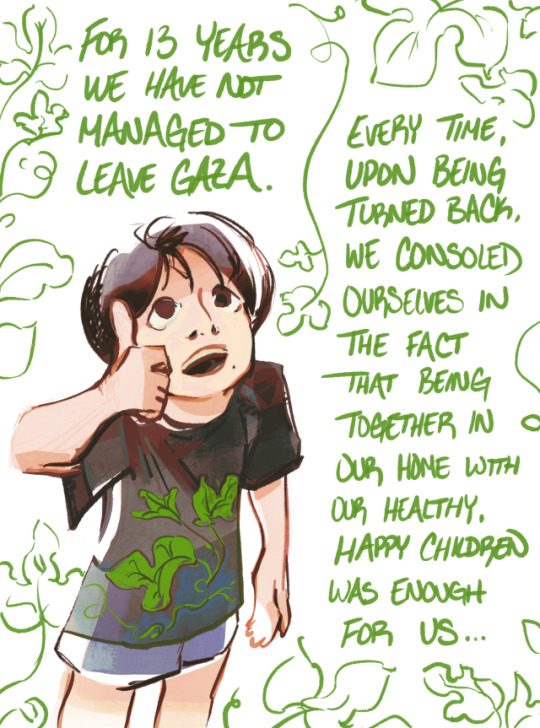
This poignant portrait was created by the talented and compassionate artist @tytolito who dedicated time and energy to shine a light on the profound struggles faced by those affected by war. The portrait captures the heart-wrenching emotions of a family devastated by conflict, where the children long for the day they can embrace their beloved father, Hashem, once more. Each brushstroke reflects their dreams of reunion and hope amidst the chaos that has torn their lives apart. This specific portrait is a tribute to a family separated by war, with the children’s sole wish being to reunite with their father.
Think of someone you love dearly. A family member, a partner, a friend, your son or your daughter . Someone who brings you joy, who you feel safe around, who makes you smile. Someone who makes your life better just by being in it.
Now, picture being separated from them, not just physically apart but also aware that they are in danger. Imagine the helplessness you would feel, missing them dearly while grappling with the fear that you may never see or hear from them again.
This heart-wrenching reality is what the Badr family is facing. The devastation caused by war has impacted countless lives, leaving so many relying on the kindness and compassion of others to survive. It’s a profound reminder of the strength of our connections and the importance of supporting one another in times of crisis.n. Not only being apart from them, but knowing they are in danger, and being helpless to do anything about it. Both missing your loved one, and living with the constant dread that you might never see or hear from them again. This is what the Badr family has been living through. The war has brought all sort of damage on people and their only way to survive it is by the kindness of other humans.
@dykesbat @fromjannah @nightowlssleep @writerqueenofjewels @girlinafairytale @kaapstadgirly @sayruq @maoistyuri @queerdaydreamz @gir-posting @lune-tic @the-ballerina-battle @from-the-river-to-the-sea @kibumkim @lookineedsleeps-art-blog @loserlesbianongsa @artificialcaretaker @hyperfixatingmenever@brokenbackmountain @doctor-a-snakeman @schoolhater @flower-tea-fairies @queerstudiesnatural @wolfythewitch @turian @turtletoria @ur-daily-inspiration @ibtisams @irhabiya @ot3 @olovelymoon-slow-answers @plomegranate @ashwantsafreepalestine @determinatenegation @good-old-gossip @lonniemachin @zigcarnivorous @cherifaouachani @vakarians-babe @blackpearlblast @baby-girl-aaron-dessner @neechees @neptunerings @mazzikah @memingursa @malcriada
241 notes
·
View notes
Text
When I study the Tanach one of the many things I do to try and understand it better is to look at whatever part I'm focused on with an understanding of the historical and cultural context and awareness as to when a certain text, commentary, etc. would have been either written or the story taken place.
Because it ends up being incredibly clarifying and elucidating.
And so when I look apply that same parameters in way to a lot of rituals we do as Jews, the Holidays we observe, and the how of it all. It is so obvious how intertwined we are with the Our Land.
So many of Holidays are agricultural in nature. Even though Pesach is about Hashem saving us and taking out slavery it is still very tied into the growing of wheat.
Same goes for Sukkot and Shavuot.
We have a whole bunch of Mitzvot that all about the land and growing and not growing that only apply in Eretz Yisrael. The Shmita Year. The year that we to leave the lands fallow so they may rest.
There are even rules about one disposes of the peels of fruit and vegetables because it must been done in a specific way during that year.
Or think about the Mikvah which is running fresh water which pretty much for most of our history meant a river. Especially when it came to dishes.
Despite the fact that we may be oldest living group of people who have been Diaspora and with the longest Diaspora we none the less maintained an unbroken connection to our Homeland, still kept our rituals which show our connection to our Homeland, and while it may have been small we still kept an unbroken presence in our Homeland all this time.
That is incredible. That is miraculous. That is awe some.
We have also kept our language, our names, our history, and our memory, and our culture.
And while most of the world does not appreciate that and in fact does not see just how an a difficult of a task that is or care to understand why that is an almost impossible task when you are forced in Diaspora, are as old as we are, and through out our history have had people forcibly try to take these things away, and also as a people are not all located together.
It is wild.
Instead the world judges us for being in Diaspora in the first place, for being murdered, for being enslaved, for being raped, for being stolen, for being born in lands that not ours, for being strangers in strange lands, for being not allowed to return to Home, for looking the way we do be too ethnic or not ethnic enough.
All while telling us to go back where we come from, but denying that we come from our Home, refusing to acknowledge any role they may play in anything, ignoring all history and context, and ignoring how amazing our survival is.
There are parts of this world that if you move the very earth gives testament to how our innocent blood has soaked because just moving the ground will shake up our hidden bones.
The reality is we will survive this and we will dance again.
And this will just be another very long chapter in our history.
Because for all people speak of the ancient world and its many empires they always seem to forget that we, Am Yisrael, were alive for that too.
We watched those very empires be born, rise, rule, fall, and then turn dust. To become ancient relics, to lessons in schools and something to study. To be something in seen in museum or history book. Or for a not so accurate version in movies or tv shows.
But we didn't go anywhere. We saw it all and we remembered it all. Oh we suffered yes, but we survived and we thrived and we danced again.
So too this shall survive, shall we live, shall we thrive, shall we dance again.
And if not us then the next generation or the one after them and so on because Am Yisrael Chai עם ישראל חי
62 notes
·
View notes
Text
when people try to bring up avraham aveinu as an example of a colonizer to gotcha jews lmao…
hunter gatherers and nomadic herdspeople are not and never were settlers or colonizers. to say so is absolutely offensive.
avraham, or avram’s people were nomadic herdspeople, NOT people who settled in ur and built cities. his people were historically referred to as the HABIRU. (habiru was more of a slur btw for nomads and other “unsavory” people according to mesopotamian society.)
it is argued that in the gilgamesh story, enkidu was a representative of people like avram, who were migratory and more connected to nature. gilgamesh represented the settled city people.
the nomadic people roamed ALL ACROSS THE LEVANT, of which canaan was a huge chunk. they lived in canaan, were born there, etc. living in ur for a season doesn’t change that.
AND THEN avram’s children married the locals in israel btw, but they were still all indigenous to the region regardless.
genetically, canaanites and israelites are pretty much the same people. we deviated from each other culturally over paganism vs monotheism. canaanites chose to keep worshipping gods like baal and we chose hashem. and yes, we warred against each other. nearly every ancient people did.
the biggest difference between us and many other ancient peoples is we are still here and we can tell our story. numerous ancient tribes cannot.
but anyway, we can see the lasting remnants of these nomadic herdspeople origins in jewish culture today. we have so many sacred torah stories about herding too.
if people learned history, that would be great jfc.
#my history professor mother almost had a fit when i told her people try to use avraham aveinu to gotcha jews online lmao#jumblr#antisemitism#israel#jewish history#also we have various stories in the midrash that differ from this but historically hebrews derive from habiru#i can connect both
84 notes
·
View notes
Text
I'm sorry, but actually I'm not over that comment whining about how several of the JVP ritual, uh, practices and bastardization of Judaism are being excluded and how we can't police people's identities.
Actually yes we absolutely can.
[Rant incoming]
Listen, I hate exclusion, alright? Inclusion is always the answer when it comes to people knowing who they are. Every obnoxious identity policing thing in the queer community that has divided us and ripped apart communities has been cruel, counterproductive, given platform to bigots, a distraction from the real issues bearing down on us, and honestly just dumb as a box of rocks. Okay? Okay.
But Jewish identity works differently, because it isn't about YOU. Becoming Jewish is about taking on Jewish culture and religion, a closed ethnoreligious culture, through the narrow path consented to by the collective Jewish people. There IS a path, but it is a highly supervised one. Otherwise it's just appropriation and cultural theft; something Jews have been subjected to for millennia. And if you do legitimately convert you do so because you love the Jewish people - the whole Jewish people - and want passionately to be a Jew for its own sake. You want to join our nation-tribe. You want to join our family.
And the crazy thing to me, the thing that still blows my mind, is that this is allowed! Even after millennia of appropriation, oppression, violence, expulsions, and genocides, Am Yisrael still accepts genuine gerim. It would be so understandable if they had closed the path entirely and tried to shut out outsiders who might bring in danger on their heels even if they themselves were not dangerous.
But they didn't. We didn't. To me this is a miracle, a blessing, and sign of true faith and hope. It is a privilege to be here.
Yet in the same turn, you gotta respect the process! You can't just declare yourself a Jew simply because you feel like it — it doesn't work like that. You can't just declare yourself an Argentinian one morning either without becoming a citizen first, even if you have Argentinian ancestry. And sure, if you do have some of that ancestry, you are connected to the nation, but that's different from being given a vote y'know?
Using a totally unsupervised, totally unsanctioned, brand-new neo-pagan ritual to unilaterally declare your membership in a tribe does not make you one of us. If anything, it proves why you never will be.
Now! Let's assume for a moment that we are referring only to the provably halachic Jews whose connection and backgrounds are beyond reasonable questioning.
You can never really leave the tribe, but you absolutely can apostasize. Plenty of Jews do it. There are plenty of Jews who find that Judaism is not spiritually fulfilling for them but something else is, and they convert out. There are halachic Jews who have walked away from Judaism in order to practice any other number of religions: Christianity, Islam, Neo-paganism, Hinduism, etc.
That is their prerogative, but by doing so they turn away from their people in a serious way and cannot be said to be practicing Judaism. There is of course room for many different types of Jewish practice, but conversely, there are practices that are too far removed from Judaism to meaningfully be considered as such. Otherwise, it's no longer a coherent group identity. And because Judaism is a collective identity, that actually matters.
The Jews as a people have decided that worshipping gods that are not Hashem is not within the realm of Judaism, which is why messianic "Jews" are not practicing a valid form of Judaism even if they are halachicly Jewish and/or have Jewish ancestry. Worshipping Jesus makes you a Christian or at least adjacent. That is a hard boundary.
And yeah — if you change the basic meaning of holidays, if you bring in lots of practices that are brand new and have no halachic or even historical basis, are often highly individualistic, and would not be accepted as Judaism by the vast majority of Jews, then it absolutely falls outside it. If I started practicing a religion that made little icons of Muhammad to pray to once a day and celebrated my ingenuity with pork roast and a nice glass of wine, I don't get to say that I'm practicing Islam.
These people are doing the Jewish equivalent. It is something else entirely. Especially because so many of these practices spit in the face of major tenets of Judaism and go against Jewish values.
To treat it otherwise is to treat it as an absolutely meaningless aesthetic rather than a living breathing ethnoreligious tribe of people who get to decide our own community's boundaries and practices collectively.
And for the naysayers who still disrespect Judaism and Jewish identity and peoplehood so much that they think that they get to define Judaism more than actual rabbis? Look, we can't physically stop you from calling yourself Jewish, but by the same turn, YOU can't force US to recognize you as one of us. You can be mad, but that's the thing about group cultural identities — that cultural group gets to decide whether they claim you or not.
[To be clear: this is not about politics — there are plenty of Jewish non-Zionists and anti-Zionists who are 100% Jewish. This is about this one specific shitty organization and this particular type of behavior.]
394 notes
·
View notes
Text
Thank Your Jewish Friends Trying to Educate You Right Now
If you’re a leftist, and you have had a Jewish friend reach out to you to try and tell you that you’ve said something alarming or harmful or antisemitic: listen to them, learn, and say thank you.
I am VERY lucky in that all the friends I’ve personally reached out to have taken the opportunity to learn and grow and adjust their behavior. I have never told them that they should not advocate for Palestine. I have told them I want to advocate for Palestine WITH them, but I need to feel safe in order to do so. I need to feel like the people I’m advocating with don’t want me and my loved ones dead. Thank HaShem that they have listened to me. From the bottom of my heart, my friends are a blessing.
But I’ve seen an incredibly disheartening number of fellow Jews who have had the opposite experiences—being expelled from their queer communities and activist communities and book clubs and any space they once found community. This is horrid but it’s especially horrid for Jews. It’s a reminder that we are only accepted if we conform. We are only accepted if we accept abuse. Our presence is always tolerated, never wanted. Our views are not to be trusted. Our opinions are always suspect. Our motives are always sinister. Our acceptance is always conditional. And I think that hurts even more for us than you’d imagine, because our own spaces are no longer safe. We are already in diaspora. And now our synagogues and homes and other community buildings are being vandalized and attack. We are cut off from our own cultural community and now many of us are being cut off from our personal communities as well. It is a loneliness that most people outside of a diaspora will never know.
Im willing to bet that if you have/had a Jewish friend who you considered close but who seems to have disappeared from your life, it’s because you either didn’t reach out to them after 10/7 or you have failed to acknowledge the stochastic threat to Jews or the Jewish connection to Israel. Why is it important that you do this? Because we are your friends and loved ones. And when friends and loved ones tell you they are hurting, you should listen. When you say you care about someone, you should be willing to listen to them when they say you’re hurting them and then you should apologize. It is more hurtful than you can possibly imagine to watch people you thought cared about you decide to listen to people across the world who they have never met rather than simply have a conversation with a friend, because they assume that friend will dismiss the pain of Palestinians.
Many of you are assuming what your friends are feeling about Israel and Palestine, but you haven’t actually asked them. Many of you think that expressing sorrow for Israel or jews in the world, that means we cannot care about or want a better future for Palestine.
If you are lucky enough to have a friend who has tried to reach out to you, that means they are willing to forgive you for neglecting them in this time. They are willing to talk with you and try to explain their emotions in good faith. They want to find a way to advocate for progress with you. They want to keep you in their lives. They want you to understand our culture and history—not at the exclusion of anyone else’s culture and history—just at the inclusion of our own.
Because here’s the other thing: they won’t forget that you denied them understanding and respect and the benefit of the doubt. That’s not a threat. That’s a cultural feature of Judaism. We have famously long cultural memories. We remember the people and places we can trust and those who refused to give us peace and safety and basic kindness. We remember the people who targeted us, your friends and loved ones, simply because other Jews who we have never met behaved in ways you don’t understand and of which you don’t approve. You are blaming the sins of others on people you claim to love.
If someone is giving you the chance to undo the damage you have done on this, you should take it. And if you have expelled Jews from a space you once shared or failed to acknowledge their pain in this time—find them and apologize.
I am not Muslim, but I wouldn’t doubt that something similar is happening in Muslim spaces. Islamophobia and antisemitism are at terrifyingly high levels right now. And if you think you can’t support Jews without condemning Muslims or you can’t support Muslims without condemning Jews, you’re not only part of the problem—you’re the biggest part of the problem.
What we all need right now is unity, peace, solidarity, understanding, and education above all else.
548 notes
·
View notes
Text
Chapter 1: The Streetkid

2/14/2077 Dear Diary, I turned 25 today. Quarter of my life and I've done fuck all with it. But guess how I celebrated? I got jumped by some Valentinos in the alley outside the Coyote. Don't ask why, you already know the answer. I fucked one of their girlfriends.
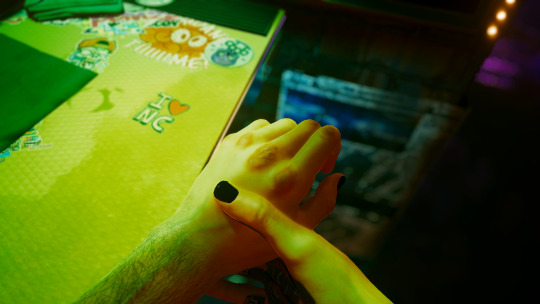
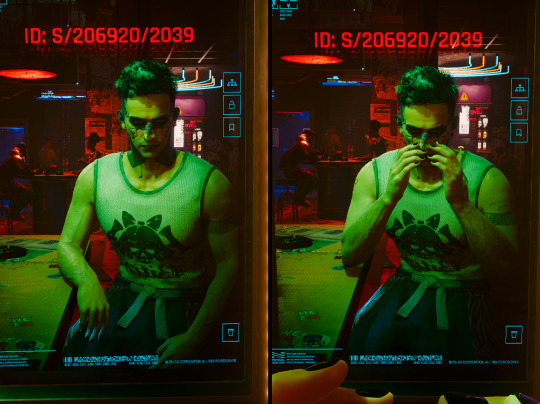
After a shot of tequila from Pepe I set my own nose. I swear I break my nose at least once a year and you'd think it would hurt less by now.
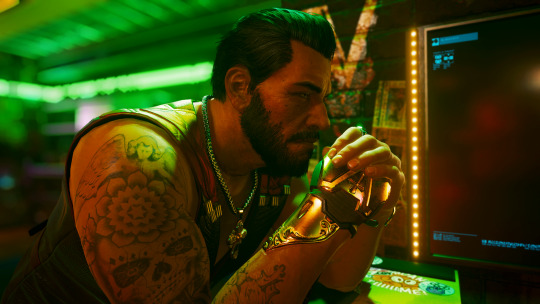
So Pepe apparently borrowed some money from Kurt and hasn't been able to pay it back so now I gotta talk to Kurt. I swear to Hashem if I get arrested because of that motherfucker again…
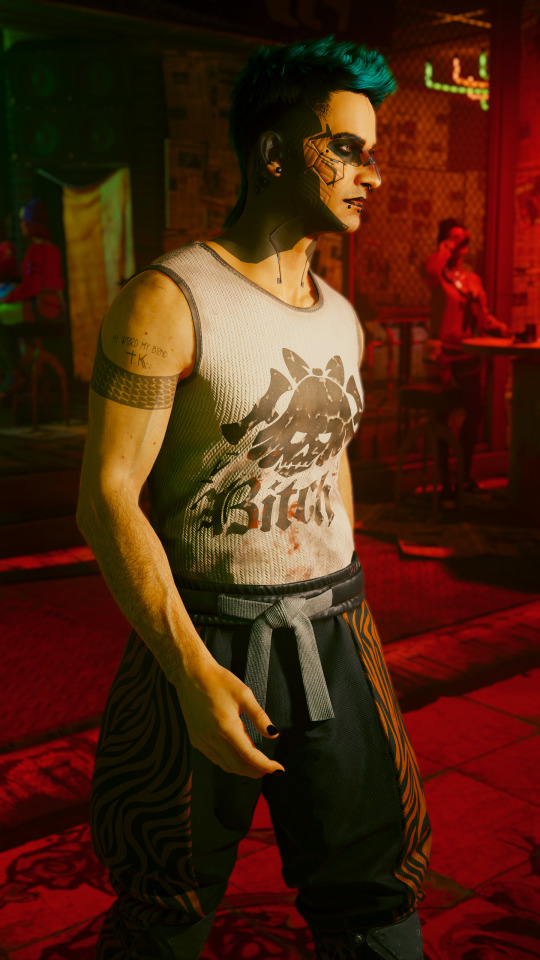
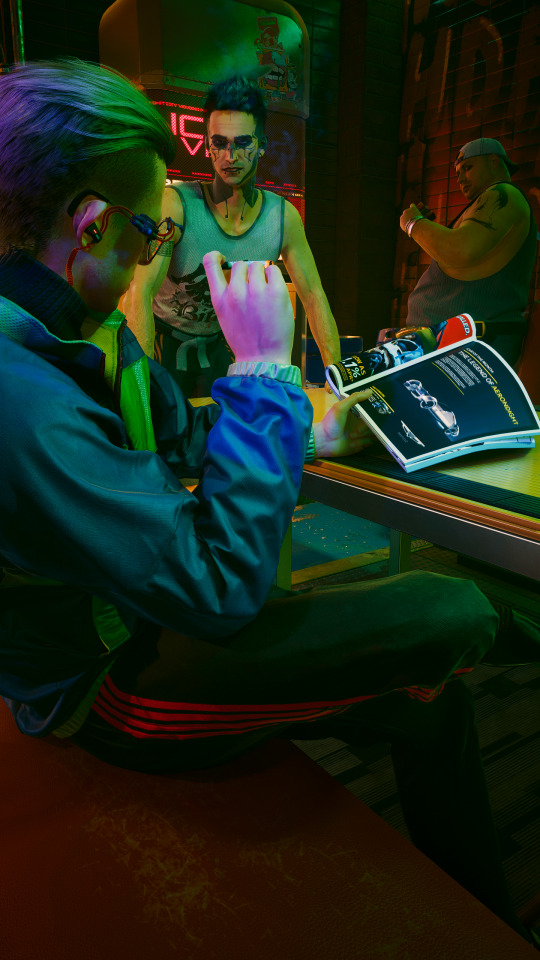
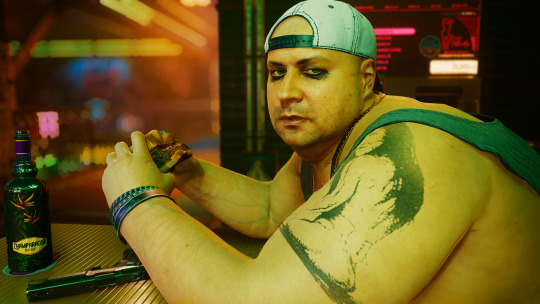

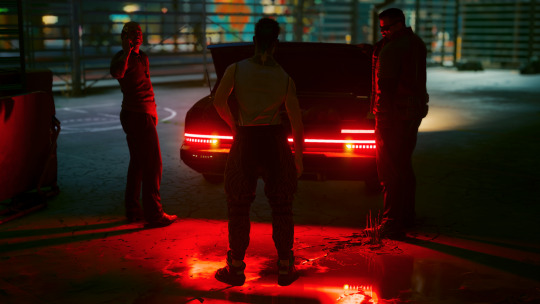
I did get to see Padre, though. I don't visit the guy that took me in as often as I should. But, I know he doesn't mind, got no expectations of me. I think…I think I kind of always knew or felt like he was a surrogate dad to me ever since he sat with me after my Bar Mitzvah. He was like that for a lot of the orphans.
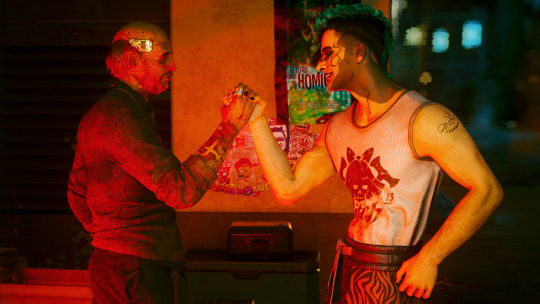
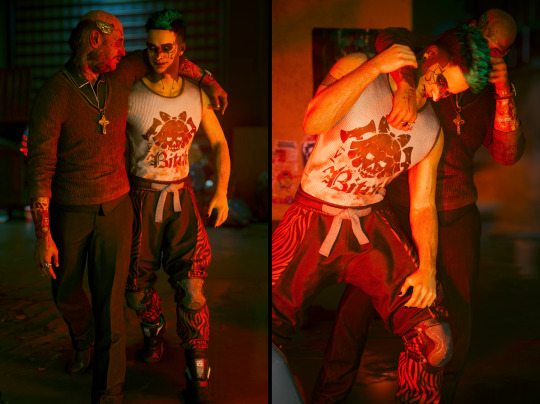


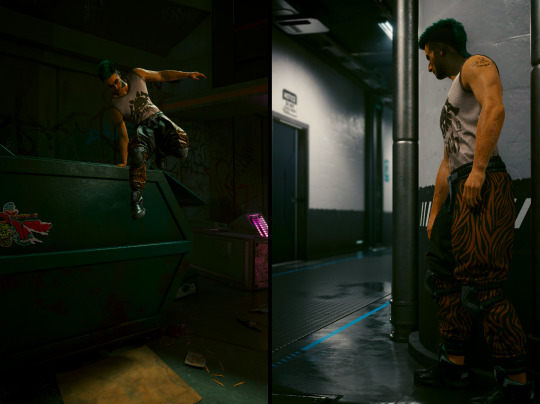
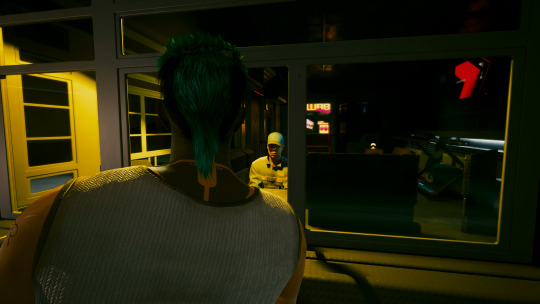


2/16/2025
Dear Diary,
Bad news: I got arrested.
Good news: Jackie did too.


Met him after my parents died and I started hanging around Padre's, he was cool but we didn't really run in the same circles. He was on track to be a Valentino and I was just a skiddie nerd making money for food by sucking dick in the alley.

Apparently, we were working the same gig. Imagine that! Kurt fucking me over. Jackie pulled a gun on me but by the time he recognized me the pigs were already there. We were put in the same holding cell and just talked the whole time about anything and everything. Just instant connection. I talked about netrunning and he asked me why I was getting my hands dirty if I could do shit from the comfort of my own home.
Nah, sitting in a chair was never for me. Besides, I like testing my limits and nothing beats the thrill of trying to shoot accurately while looking at a screen.
That's a joke. But, I do love fighting. It's fun, y'know? The pain reminds me I'm still alive. Anyway, he's got a couple gigs coming up and wanted me to tag along and see if we can't work some magic together because he wasn't sure about this other 'runner he'd been paired up with a couple times.
I asked who it was and my eyes nearly popped outta the socket when he said it was the T-Bug. I've been following her work for ages. She's usually the first one posting schematics for new security hardware and firmware exploits for them.

He's really obsessed with the idea of being a legend, getting into the Afterlife and shit. I dunno what I wanna do with my life, man. But, I got plenty of time to figure it out.
----------
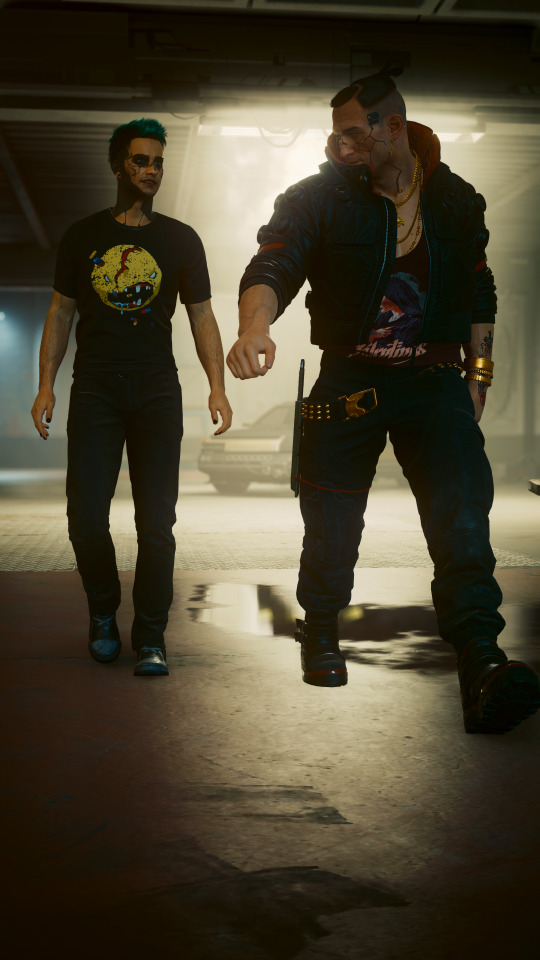
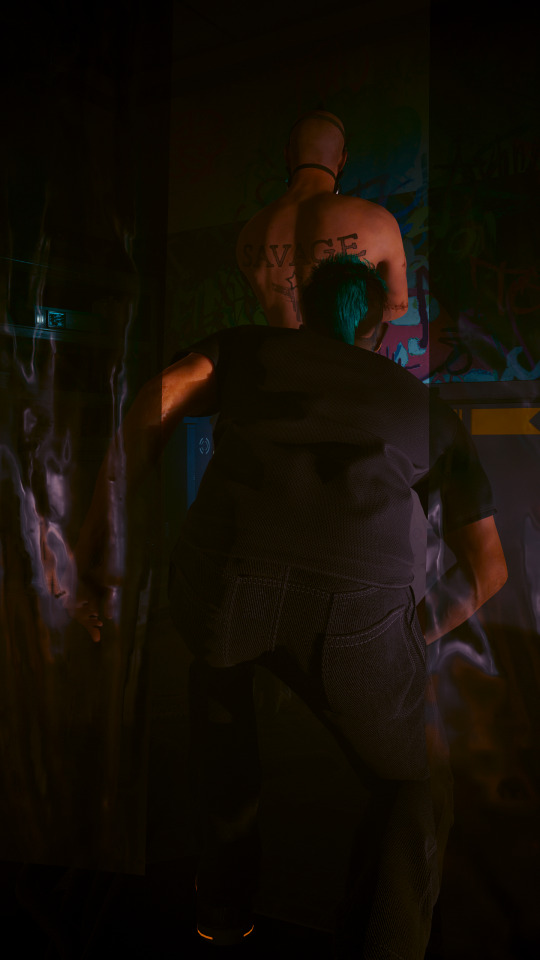
5/10/2077
Dear Diary,
Fucked up gig today. Hired to rescue some corpo from scavs. Fucking vermin, bodies in a bathtub full of ice, keeping 'em just barely alive until it's time to scrape the cyberware outta ya. We got there just in time. Dropped all the scavs quiet, too. Quite a feat considering Jackie ain't the sneaking type.
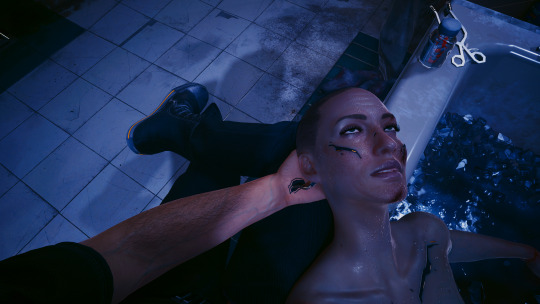
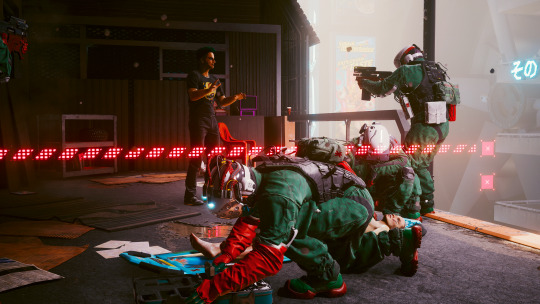
Oh yeah, and guess who's working with T-Bug now? Took every ounce of willpower not to fuckin' squeal like a fangirl when she came up on the holo the first time.
#cyberpunk 2077#oc: vincent guerra#virtual photography#cyberpunk photomode#masc v#emotional support imagination playground#jackie welles#quest vp
40 notes
·
View notes
Text

🧵 Confession: I'm a bad Jew.
I keep Shabbos. I eat kosher. I try to do the mitzvot. But I don’t pray. Not enough. Honestly… not at all.
And I need to talk about that. Because maybe you’re in the same boat. Or maybe you think you’re not. But hear me out.
(1/)
Let’s start here: I never really understood what “prayer” was. I thought it meant asking G-d for stuff. Or mumbling words I didn’t connect to. Or going through the motions in shul.
So I avoided it. And I’ve avoided it for years. (2/)
But here’s what I keep forgetting:
In Hebrew, the word for prayer is להתפלל – lehitpalel.
And it doesn’t mean “to pray.”
It doesn’t even come from a root that means “to ask.”
(3/)
The root of להתפלל is פל"ל.
It means: To judge. To assess. To intercede. To reflect. Not “beg.” Not “request.” Not “wish.” But something far deeper. (4/)
להתפלל is in the hitpa’el form. That means it’s reflexive.
So the real meaning of lehitpalel?
→ To judge oneself. → To reflect inwardly. → To stand before G-d in honest self-assessment. It’s not about changing G-d. It’s about changing me. (5/)
In fact, in the Torah, when it says someone “prayed,” the word often means they intervened or stood up in the breach.
Pinchas didn’t just say words—he acted to stop a plague. Moshe didn’t beg—he defended us. Avraham didn’t plead—he argued for justice. That’s פלל. (6/)
So now I realize: Maybe I haven’t been avoiding “prayer.” Maybe I’ve just misunderstood what it was supposed to be. Not a wishlist. Not lip service. Not guilt. But a chance to stand before Hashem��raw, real, reflective.
(7/)
So yeah. I’m a bad Jew. I do the external stuff, the “visible” stuff. But I haven’t stood before G-d with my whole self. I’ve been afraid. Or ashamed. Or maybe just distracted. But I want to change that. Not for G-d’s sake. For mine.
(8/)
If you feel the same… You’re not alone. And maybe the first tefillah—the first true one—isn’t in the siddur.
Maybe it’s just whispering: “Here I am.” “This is who I am.” “I want to come closer.”
That’s where I’m starting. (9/)
And given that I, and many others, just sat through another fearful siren, all I am thinking now is, "I get the hint HaShem. You need MY tefillot now more than ever."
As much as I am nothing, and I am nothing, the world was still made for me, as it was for you.
(10/)
Time to step out of my comfort zone and speak to Hashem. To tell Him what’s really going on—in me, with me. Confess. Admit. Rip my chest open and let my soul pour out like a river.
I can’t fix the world. But I can clean up my side of the street.
(11/11)
44 notes
·
View notes
Text
That post about "girls loving patterns and dissection of media" that has thousands of notes only goes to prove the antisemetism on tumblr and in other fandom spaces. Dissection of media (no matter how much I disagree with your stupid ass headcanon) is a basis of fandom, and for those same people to turn "jews fight god" into something irreverant is so antisemetic.
For Jews, discussion is holy. God did not create loopholes so we can "haha gotcha!" Him. He did it for his "children to best" him. Discussion of laws and following said laws are intrinsticly linked if you believe discussion is an act of religion. If you believe that it is holy to learn, ask questions, and grow. To follow your conceptions. This is Judaism. Starlightomatic (iirc) made a post years ago about how uncomfortable they were with people who encountered Judaism through tumblr acting as if all Judaism is was "fighting god," and how it was important to note that many Jews actually enjoyed engaging in halacha. The fandomization of "judaism is the religion that fights god" and the antisemetism culturally inherent in goyiche societies turned Judaism on tumblr into the "leftist religion" of radical rejection instead of what Judaism is. "Fighting god" (which is a simplification (*cough cough* fandomization) of a much more complicated biblical story) should not be through defiance. It is joyous. Hashem gave us free will and thought, and we find the patterns and connections that He left for us among his commandments to find and build.
"My children have bested me," does not mean that we beat god derogatorily. It is Hashem, our parent, seeing how far we've come in Their ways and the pride, nachat, of seeing your children succeed.
#for the antisemites who cant read: youre wrong and dont understand judaism.#hashem loves us and our success brings him nachat. suck it
66 notes
·
View notes
Text
I'm sure other Jews in this fandom have already discussed this in depth, but it really is so striking to me that it's specifically a mass shooting that sends Robby over the edge. Not just any mass casualty event: a mass shooting. And I don't necessarily think this was intentional on the part of the writers, especially because it is heavily implied that what triggers Robby's panic attack in the wake of losing Leah is specifically his guilt and grief over Dr. Adamson's death, but like...
Robby is a Jew from Pittsburgh. He may very well have some trauma and triggers specifically related to mass shootings. The Pittsburgh Jewish community numbers about 50,000 people over the Greater Pittsburgh area, primarily concentrated in Squirrel Hill (the neighborhood where the Tree of Life shooting took place) and the surrounding neighborhoods, and like most Jewish communities in mid-sized American cities, it tends to be very tight-knit and interconnected. (I can't tell you how many times I've met another Jew from the Greater Baltimore area for the first time and discovered within an hour of talking to them that we have at least one mutual acquaintance.) It's entirely plausible that he'd be at most two or three degrees of separation from one or more of the victims of the Tree of Life shooting. Maybe he'd been to the shul before to attend a family member's wedding or bar mitzvah.
I just think it adds such an important level of depth to that scene that his grief and trauma from the Tree of Life shooting is compounding his grief and guilt over being unable to save Leah, another mass shooting victim he didn't actually know but felt a deep personal connection to. And then there's the fact that when he's at his absolute lowest, he turns to his faith and his heritage, reciting the Shema as he clutches his Magen David, finding comfort in the Jewish declaration of faith in Hashem, a god Robby doesn't really even believe in. It's already such a powerful and profoundly Jewish action and Jewish scene, but it takes on an even deeper and more Jewish meaning against the background of Robby's specific mass shooting-related trauma. It reminds me of how the Shabbat after the shooting, synagogues across the country were absolutely packed with Jews showing up to shul, some of them for the first time in years, because in the face of tragedy, of loss, of antisemitic attacks and attempts to wipe us out, that is what we do as Jews: We turn to each other and to Hashem, uplifting our people and our Jewishness even more fervently, knowing that this is how we have survived every catastrophe our people have endured.
44 notes
·
View notes
Note
permanent existence in any form where I retain a distinct sense of self sounds extremely unpleasant to me. I've always been more of a "I want to become the water" mystic than a "I want to drink the water" mystic.
Can you please tell me more about this?
So permanent existence in an afterlife generally goes one of two ways:
Time continues on in an endless, eternal arrow. This seems to be what Jehovah's Witnesses believe and is implicitly reflected in "Amazing Grace" in the line "When we've been here ten thousand years...." This just straight-up sounds bad to me. I wouldn't mind living longer than I'm likely to, but I think ultimately time-bound eternal existence would be horrific.
The soul ceases to be time-bound and exists outside of time as we conceive of it. My objection here is fairly straightforward: a Dove that isn't bound by time isn't meaningfully me. If I'm so radically altered that's just a me-shaped soul, but I don't feel any connection to it.
I'm a mystic in the sense that I believe that words are incapable of expressing the most profound truths about ultimate reality and matters of ultimate concern. And mystics tend to go one of two ways. The first is that they seek to "drink the water," to remain discrete individuals who are filled with divine presence. I find that objectionable (if it's eternal) for the reasons expressed above. The second is to "become the water," to become so overwhelmed by divine presence that they are overwhelmed by it and their individuality ceases, all boundaries are broken, and everything is One. Assuming that either drinking or becoming the water are options (and I sadly suspect they probably aren't; my belief is that the most likely thing to happen when I die is to cease to exist*), I prefer becoming it.
*I think expressing it as "cease to exist" is not really accurate. I'm very much of the opinion that the past is ontologically real and that it's entirely meaningful to speak of, say, Anne Frank (may Hashem avenge her blood) as eternally existing between 1929 and 1945.
28 notes
·
View notes
Note
Does anyone have any advice for when davening feels too hard? I've been really struggling with my mental health lately, and I just can't seem to find the motivation even though I know it will make me feel better. Basically at this point I don't even have the energy to get out of bed, get my siddur, and say the amidah. So the only things I've been doing are things I have memorized, like the first paragraph of the Sh'ma and some brachot. I can tell that I really need G-d right now, but I can't seem to make myself do the work. I mentioned this to a friend, and they said that HaShem would understand and it doesn't matter if I'm doing it "right," but we've been given ways to pray and connect with Hashem, shouldn't I do that? Formal davening, with the traditional liturgy, in Hebrew, makes me feel better, so I try to push myself to do it even when it feels like a drag at first, but what about when I'm too mentally and physically tired to even stand for 5 minutes or read in Hebrew?
For medical advice, please see a doctor or psychiatrist/therapist etc.
23 notes
·
View notes